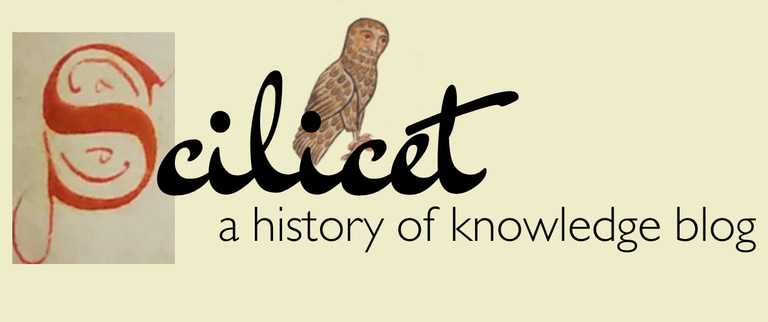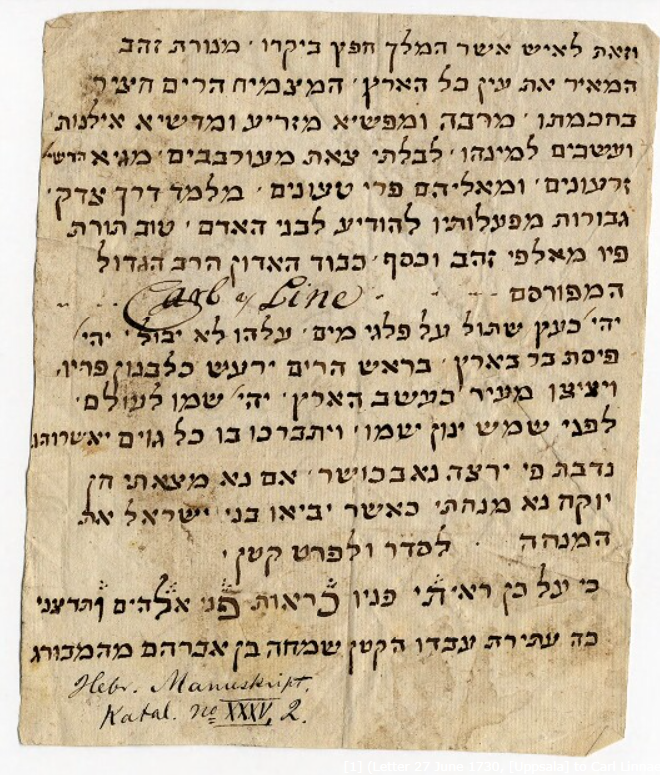The Swedish botanist Carl Linnaeus is best known for his invention of binomial nomenclature, where species are named using two latin words. But did you know that he also spent a considerable amount of time engaging in correspondence? During his lifetime, he received approximately 3,000 letters, and corresponded with over 600 people and institutions. Letters like these enabled the exchange of knowledge across the world, and are invaluable sources for historians. Most of his letters were written in Swedish or Latin, but he did receive one letter in Hebrew!
The origins of the letter are uncertain; the Alvin database has the author listed as Andreas Norrelius, but the letter itself is signed by Simha Ben Avraham from Hamburg. Norrelius was a librarian and ‘orientalist’, and is known for his Latin translation of Johan Kemper’s Hebrew Commentary on Matthew. Linnaeus did not have a very good opinion of Norrelius, describing him as ‘mean and stingy’, but considering his uncommon skill of reading Hebrew, it is possible that Linnaeus asked him to translate the letter from Simha Ben Avraham. This could explain why the letter was attributed to him in the archive’s catalogue even though it was signed by someone else.
The person who signed the letter, Simha ben Avraham, could be the well-known Rabbi Simon Calimani (who was also known as Simha Ben Avraham), a grammatician and poet from Venice (and not Hamburg). Calimani, who was himself an author and well-regarded scholar, would have been in a position to write to someone like Linnaeus to compliment him on his scholarly achievements. If we identified him correctly, it is still not clear why signed the letter ‘from Hamburg’ and not ‘from Venice’ (maybe he was visiting Hamburg and sending the letter from there?). It’s quite a mystery…
While the letter contains many biblical allusions, it also makes some references to Linnaeus’ own career.
Another curious question that can be raised here is why send a letter to someone who most likely would not be able to read it in the language in which it was written? We plan to revisit this question in the future, but for now you can find a translation of this letter below.
Quotes from the Bible are in italics. Citations are based on the King James Bible (KJV) but with slight modifications.
And this is to the man whom the king delighteth to honour,* a golden lamp that shines for all the land, who maketh grass to grow upon the mountains in his wisdom,** who multiplies and increases, he seeds and plants trees and herbs of many kinds, so as to not mix them, from the valley he cultivated seedlings, and of themselves they are loaded with fruit, who teaches the way of righteousness, to notify mankind of the valour of his deeds, the teachings of his mouth are better than thousands of gold and silver,*** his honour, the great and famous professor [lit. Rabbi] Carl Line.
May he be like a tree planted by the rivers of water,* his leaf also shall not wither, may his grain abound throughout the land, on the tops of the hills may it sway. May his crops flourish like the Lebanon and thrive like the grass of the field. May his name endure forever, may it continue as long as the sun. Then all nations will be blessed through him, and they will call him blessed.**
May he accept the willing praise of my mouth, if he likes me, may he accept my offering as the Israelites bring their offerings.* To order and a small detail.**
For therefore I have seen thy face, as though I had seen the face of God, and thou wast pleased with me.*** So is the plea of his humble servant, Simha Ben Avraham from Hamburg.
* Book of Esther, 6. 11.
** Psalms 147. 8.
*** Psalm 119. 72.
* Psalms 1. 3.
** Psalms 72. 16-17.
* To the Temple. See, Isaiah 66. 20.
** This uncommon formula is sometimes used at the end of an introduction in rabbinical texts, likely to convey the idea that the text was diligently written.
*** The context is of Jacob and Esau’s meeting in which Jacob urges Esau to accept his gift and make peace with him. Genesis 33.10.
Transcription
וזאת לאיש אשר המלך חפץ ביקרו, מנורת זהב המאיר את עין כל הארץ, המצמיח הרים חציר בחכמתו, מרבה ומפשיא מזריע ומדשיא אילנות ועשבים למינהו, לבלתי צאת מעורבבים, מגיא הדשי[א] זרעונים, ומאליהם פרי טעונים, מלמד דרך צדק, גבורות מפעלותיו להודיע לבני האדם, טוב תורת פיו מאלפי זהב וכסף, כבוד האדון הרב הגדול המפורסם ...... Carl Line
יהי כעץ שתול על פלגי מים, עלהו לא יבול, יהי פיסת בר בארץ, בראש הרים ירעש כלבנון פריו, ויציצו מעיר כעשב הארץ, יהי שמו לעולם, לפני שמש ינון שמו, ויתברכו בו כל גוים יאשרוהו.
נדבת פי ירצה נא בכושר, אם נא מצאתי חן יוקח נא מנחתי כאשר יביאו בני ישראל את המנחה. לסדר ולפרט קטן.
כי על כן ראיתי פניו כראות פני אלהים ותרצני
כה עתירת עבדו הקטן שמחה בן אברהם מהמבורג


